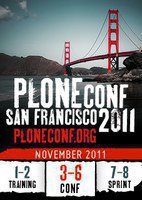Great Training Options Still Available on the Eve of Plone Conference 2011 in San Francisco

One of the outstanding things about each year's annual Plone Conference is the variety of great training it brings to the venue. Instead of having the make a separate trip - and in many cases pay more money - these classes let students learn from some of the Plone community's recognized experts by just tacking on a couple of days to the front of their conference trip.
A frequent mistake people make when looking at training associated with the conference is that it is only available to Plone Conference attendees. This is not the case. In fact, one goal of the pre-conference offerings is to bring in members of local companies, schools and user groups a chance to get world-class training right in their own back yard. The location of this year's conference in San Francisco opens the door to current and potential new Plone in one of the world's largest technology communities.
The Plone Conference 2011 has a great lineup of training set to take place over the two days before the opening of the conference - November 1 & 2. Make sure you sign up before all the seats in the class you are interested fill up. (Please note, the Conference registration fee does not include the price of the training sessions.)
The links below will take you directly to more information on each course and a page where you can register for the individual classes.
Theming Plone 4 — Chrissy Wainwright
This training session includes front-end design of a Plone 4.0 site from start to finish using two methods: Traditional Plone theming, and using plone.app.theming. The training will be a hands-on, introductory walk-through of the process, using a pre-created sample design. Attendees will need their computers and will be expected to follow along on their own local instances.
Prerequisites: Knowledge of XHTML and CSS; Basic familiarity with Plone.
Course Registration & More information on Theming Plone 4
Getting off the Ground with Plone — Cris Ewing
So you've heard about Plone, this smart, secure and powerful content management system and you'd like to get started. Where to begin? This training course is for you.You'll learn how to install Plone, how to create your first website and get started adding content, how to get quick, simple victories for your new project, and how to deploy your site when you're ready to go live.
Course Registration & More information on Getting off the Ground …
Plone Development Environment and Deployment Masterclass — Martin Aspeli
Learn to develop and deploy like a Plone pro! On the first day, you will learn how to set up a powerful and productive development environment, employing the tools the professionals use to debug, document and release manage their code. The second day will focus on caching, performance optimisation, deployment configuration and application lifecycle management.
Technologies covered will include: Buildout; mr.developer; the Python debugger; plone.reload; Sphinx; PyPI-style distribution management; plone.app.caching; HAProxy; Varnish; and nginx.
Prerequisites: Some Plone customization or development experience will be helpful to bring the content into context. Familiarity with the command line will be necessary for day two.
Course Registration & More Information on Plone Development …
Creating Custom Content Types with Dexterity — Steve McMahon
With Plone 4, the Dexterity content-type-development framework has become a practical and desirable alternative to the Archetypes framework Plone has featured in previous versions. This course will show how it's possible to use Dexterity now to build reliable and maintainable new content types for Plone 4+.
Prerequisites: Basic Python, HTML and XML. Command-line skills on your platform of choice.
Course Registration & More information on Content Types with Dexterity
Pyramid for Humans — Paul Everitt
Pyramid has emerged as a fast, modern, lightweight web framework for the Pylons and Zope communities. When you just need a web app, and not a full CMS, Pyramid lets you retain many of the same Plone technologies. This hands-on tutorial covers a little about a lot: practical introductions to the most common facilities. Fun, fast-paced, and most certainly not aimed at experts.
Prerequisites: Basic Python, HTML
Course Registration & More information on Pyramid for Humans
You can visit the Plone Conference page for more information on the conference, or follow our Twitter feed for the latest announcements.